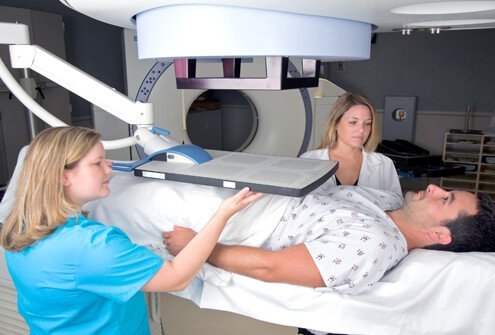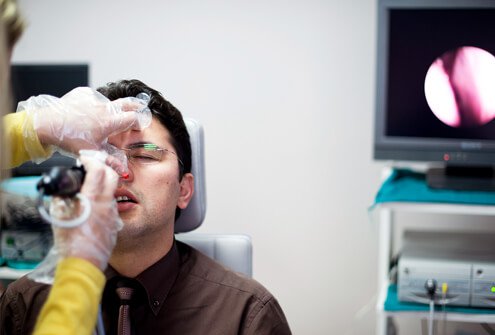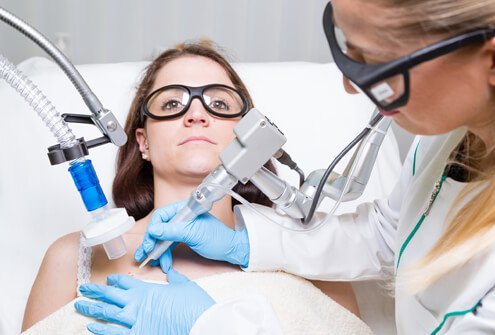What Kind of Doctor Do I Need? Find a Specialist
Finding the Right Doctor for You

Finding the right doctor can be a frustrating challenge. Our bodies' systems are connected in complicated ways. Knowing which specialist is right for which ailment often requires time, research, and expertise. In the following slides, our experts will show you who treats what medical need, introducing many of the common—and surprising—types of doctors, including cardiologists, gynecologists, and bariatricians.
Do You Need a Specialist?

For many, the decision to bring in a medical specialist is determined by one’s health care plan. HMOs require patients to first see a primary care physician, who may then refer them to a specialist. On the other hand, PPO health plans require no referral, allowing patients to choose their own specialist.
Family Physician, Internist, or General Practitioner?

Most people first bring their medical concerns to a primary care physician. There are three main types of primary care physician:
Family Physician
Family physicians treat patients of any age and gender. They often specialize in treating children, women, or the elderly.
Internist
Internists typically treat adults and usually work in clinics and hospitals. They are trained in treating all of the body’s major organ systems.
General Practitioner
General practitioners often decide whether patients can be treated generally, or whether they need a specialist. General practitioners treat patients of all ages and genders.
Know Your Doctor: Cardiologist

Cardiologists specialize in the heart and its related system, including blood vessels.
Diseases and Conditions that Cardiologists Treat
- Coronary artery disease
- Heart attack
- Stroke
- High cholesterol
- Irregular heartbeat (arrhythmia)
- High blood pressure (hypertension)
- Heart murmurs
Know Your Doctor: Allergist (Asthma & Allergy Specialist)

Allergists diagnose and treat allergies, asthma and other immune system diseases using allergy tests and other diagnostics.
Common Home and Food Allergies
Allergists help identify the cause of allergies, which can be many, including:
- Dust
- Medicines
- Foods
- Pets
- Pollen
- Latex and other substances
Know Your Doctor: Bariatrician

Bariatricians help patients lose weight. They treat obesity and related disorders.
Diseases and Conditions Bariatricians Treat
- Obesity
- High blood pressure (hypertension)
- Diabetes
- High cholesterol
- Other lipid disorders
Know Your Doctor: Psychologist vs Psychiatrist

Both psychologists and psychiatrists treat mental health conditions. Both talk you through problems, and both often work together. There are important differences, though.
Differences Between Psychologists and Psychiatrists
- Psychiatrists are medical doctors (MDs). Psychologists are Doctors of Science who have studied the mind and human behavior (PhDs and PsyDs).
- Because they are medical doctors, psychiatrists can prescribe medicine, while psychologists cannot.
Know Your Doctor: Pediatrician

Pediatricians specialize in treating children. From immunization and child development to minor health problems and serious diseases, pediatricians are trained for a variety of child-related health needs.
Pediatrician Age Limit
Pediatricians typically treat patients from birth to young adulthood. The exact cutoff varies from doctor to doctor. By age 18, a child can begin seeing an adult primary care physician, but some pediatricians will continue to treat young adults until they graduate college, or until age 21.
Know Your Doctor: Rheumatologist

A rheumatologist is either an internist or a pediatrician who is specially trained to treat autoimmune conditions and musculoskeletal diseases.
Diseases and Conditions Rheumatologists Treat
- Autoimmune disorders
- Arthritis
- Lupus
- Gout
Know Your Doctor: Neurologist

Neurologists treat disorders of the brain, spinal cord, and nerves, as well as the “sensory receptors” of the body, including the eyes, ears, and skin.
Diseases and Conditions Neurologists Treat
- Stroke
- Headache disorders
- Parkinson’s disease and other movement disorders
- Speech disorders
- Multiple Sclerosis
Know Your Doctor: Podiatrist

Podiatrists are Doctors of Podiatric Medicine (DPMs) rather than MDs. They treat the feet, including the toes, heels, and ankles. Some podiatrists perform surgeries.
Diseases and Conditions Podiatrists Treat
- Ingrown toenails
- Flat feet
- Bunions
- Gout
- Smelly feet
- Athlete’s foot
Know Your Doctor: Orthopedic Surgeon

Orthopedic surgeons treat injuries and diseases of the body’s bones, muscles, joints, ligaments, tendons, and nerves. As a result, orthopedic surgeons perform various surgeries.
Orthopedic Surgery Treatments
- Fusion: The use of grafts or metal rods to fuse bones together into a single bone
- Joint Replacement: The replacement of a natural joint with a prosthesis
- Soft Tissue Repair: The mending of tendons, ligaments, and other soft tissues
- Osteotomy: A technique for correcting bone deformities by cutting and moving the bone
Know Your Doctor: Gynecologist

Gynecologists specialize in women's reproductive health. Some are specialists who focus on certain conditions or diseases, while others work as primary caregivers for women. Gynecologists also perform surgeries on the female reproductive organs.
Diseases and Conditions Gynecologists Treat
- Ovarian cysts, tumors and polyps
- Pelvic pain
- Toxic shock syndrome
- Urinary tract infection (UTI)
- Infertility
- Fibroids
Know Your Doctor: Oral and Maxillofacial Surgeon

Oral and maxillofacial surgeons (OMS or OMFS) specialize in conditions of the mouth, jaw, and face. An OMS is like an orthopedic surgeon for the face.
OMS Surgical Treatments
- Facial reconstruction
- TMJ surgery (jaw joint surgery)
- Tooth extraction
- Dental implant surgery
- Removal of cysts and tumors from the jaw, mouth, and face
Know Your Doctor: Urologist

Urologists are surgical specialists who deal with diseases of both the male and female urinary tract, including the kidneys. Urologists also treat the male reproductive organs.
Diseases and Conditions Urologists Treat
- Urinary incontinence
- Urinary tract infection (UTI)
- Kidney stones
- Erectile dysfunction
- Overactive bladder
- Prostate cancer
Know Your Doctor: Endocrinologist

Endocrinologists treat gland and hormone conditions and diseases.
Diseases and Conditions Endocrinologists Treat
- Diabetes
- Infertility
- Osteoporosis
- Lack of growth
- Thyroid diseases
Know Your Doctor: Oncologist

Oncologists treat the various forms of cancer.
Types of Oncologists
- Radiation Oncologist: Radiation oncologists use radiation therapy for cancer treatment
- Surgical Oncologist: Surgical oncologists remove tumors and perform some biopsies
- Gynecologic Oncologist: Gynecologic oncologists treat ovarian, uterine and cervical cancers, and other cancers of the female reproductive organs
- Medical Oncologist: Medical oncologists treat cancer with targeted therapies and chemotherapy
- Pediatric Oncologist: Pediatric oncologists treat childhood cancers
- Hematologist-Oncologist: A hematologist-oncologist treats blood cancers like leukemia
Know Your Doctor: Otolaryngologist (ENT)

Otolaryngologists are sometimes called ear, nose, and throat doctors (ENTs). They treat those body parts, as well as related body parts in the head and neck.
Diseases and Conditions Otolaryngologists Treat
- Tinnitus
- Smell disorders
- Swallowing disorders
- Facial deformities
- Hearing loss
Know Your Doctor: Pulmonologist

Pulmonologists treat the lungs and related body parts.
Diseases and Conditions Pulmonologists Treat
- Cystic fibrosis
- COPD (chronic obstructive lung disease)
- Emphysema
Know Your Doctor: Gastroenterologist

Gastroenterologists treat the various parts of the digestive system, including the stomach, intestines, esophagus, liver, pancreas, colon, and rectum. Gastroenterologists also perform endoscopic services, including colonoscopy.
Diseases and Conditions Gastroenterologists Treat
- Liver disease
- Celiac disease
- Colon polyps
- IBS (Irritable Bowel Syndrome)
- GERD
- Gastroenterologists also perform endoscopic services, including colonoscopy
Know Your Doctor: Dermatologist

Dermatologists treat diseases and conditions of the skin, hair, and nails.
Diseases and Conditions Dermatologists Treat
- Skin cancer (melanoma, basal cell carcinoma, squamous cell carcinoma)
- Vitiligo
- Acne
- Cysts
- Warts
- Eczema
Leading Your Team of Physicians

When it comes to your health, playing an active role is important. Knowing the roles of the various medical specialists can help you make the best decisions when looking for care and treatment options.
Take the Lead With Your Health Care
- Don’t be afraid to ask questions. Your doctors want you to understand your health care options.
- Make sure all of your doctors know your health history.
- Bring a list of medications you are taking each time you visit a new doctor.
- Remember that it may take more than one specialist to treat complex medical conditions.
What Kind of Doctor Do I Need? Find a Specialist
IMAGES PROVIDED BY:
- iStock
- BigStock
- MedicineNet
- iStock
- iStock
- iStock
- iStock
- iStock
- Getty Images
- iStock
- iStock
- iStock
- iStock
- iStock
- iStock
- iStock
- Photolibrary
- iStock
- iStock
- iStock
- Getty Images
- iStock
REFERENCES:
- BlueCross BlueShield: “Five Tips for Choosing a New Primary Care Physician”
- What's the Difference Between an HMO, EPO, and PPO?
- American Academy of Family Physicians: “The Specialty of Family Medicine.”
- American Academy of Otolaryngology: “What Is an Otolaryngologist?”
- American Academy of Allergy Asthma & Immunology: “Feel Better. Live Better. See an Allergist/Immunologist”
- American College of Physicians: “Pulmonary Disease: The Discipline”
- American College of Gastroenterology: “What is a Gastroenterologist?”
- American Academy of Dermatology: “Why See a Dermatologist”
- American Academy of Pediatrics: “Definition of a Pediatrician”
- American College of Rheumatology: “What is a Rheumatologist?”
- BlueCross BlueShield: “Five Tips for Choosing a New Primary Care Physician”
- Bariatrics.com: “A Personal Message from Dr. Horowitz”
- California Medical Association: “Taking an Active Role in Your Health Care"
- Cancer.net: “Types of Oncologists”
- Endocrine Society: “About the Endocrine Society”
- Hormone Health Network: “What is an Endocrinologist?”
- Learn.org: “Be an Internal Medicine Doctor”, “What Are the Different Occupations in the Medical Field?”, “Cardiologist: Job Duties, Occupational Outlook, and Education Prerequisites”, “What Are the Job Duties of an Obstetrician/Gynecologist (OBGYN)?”
- Mid-Columbia Medical Center: “Cardiology”
- National Health Services: “Foot Problems and the Podiatrist”
- Obesity Action Coalition: “What is a Bariatrician?”
- OrthoInfo.org: “Orthopaedics”
- UT Health Science Center: “Oral & Maxillofacial Surgery”
- University of Maryland Medical Center: “What is Oral and Maxillofacial Surgery”
- Urology Care Foundation: “What is Urology?”
- University of Rochester Medical Center: “What is a Neurologist?”, “Obstetrics & Gynecology- Gynecology Division”
© 1996-2022 WebMD, LLC. All rights reserved.
Source slideshow on OnHealth
